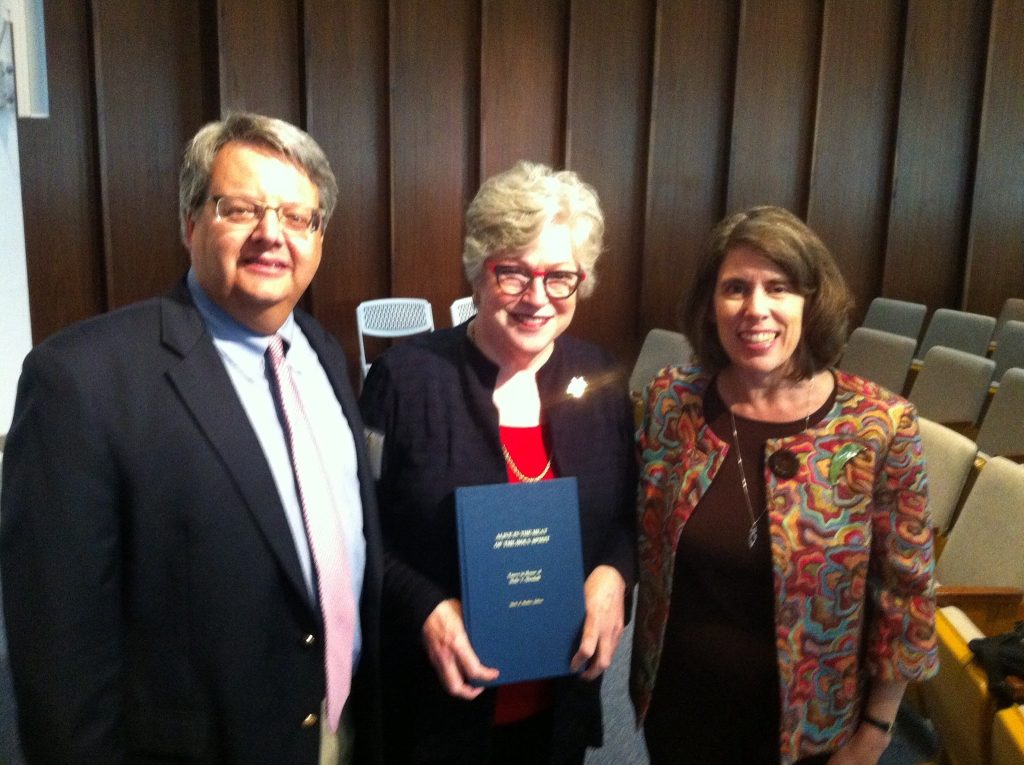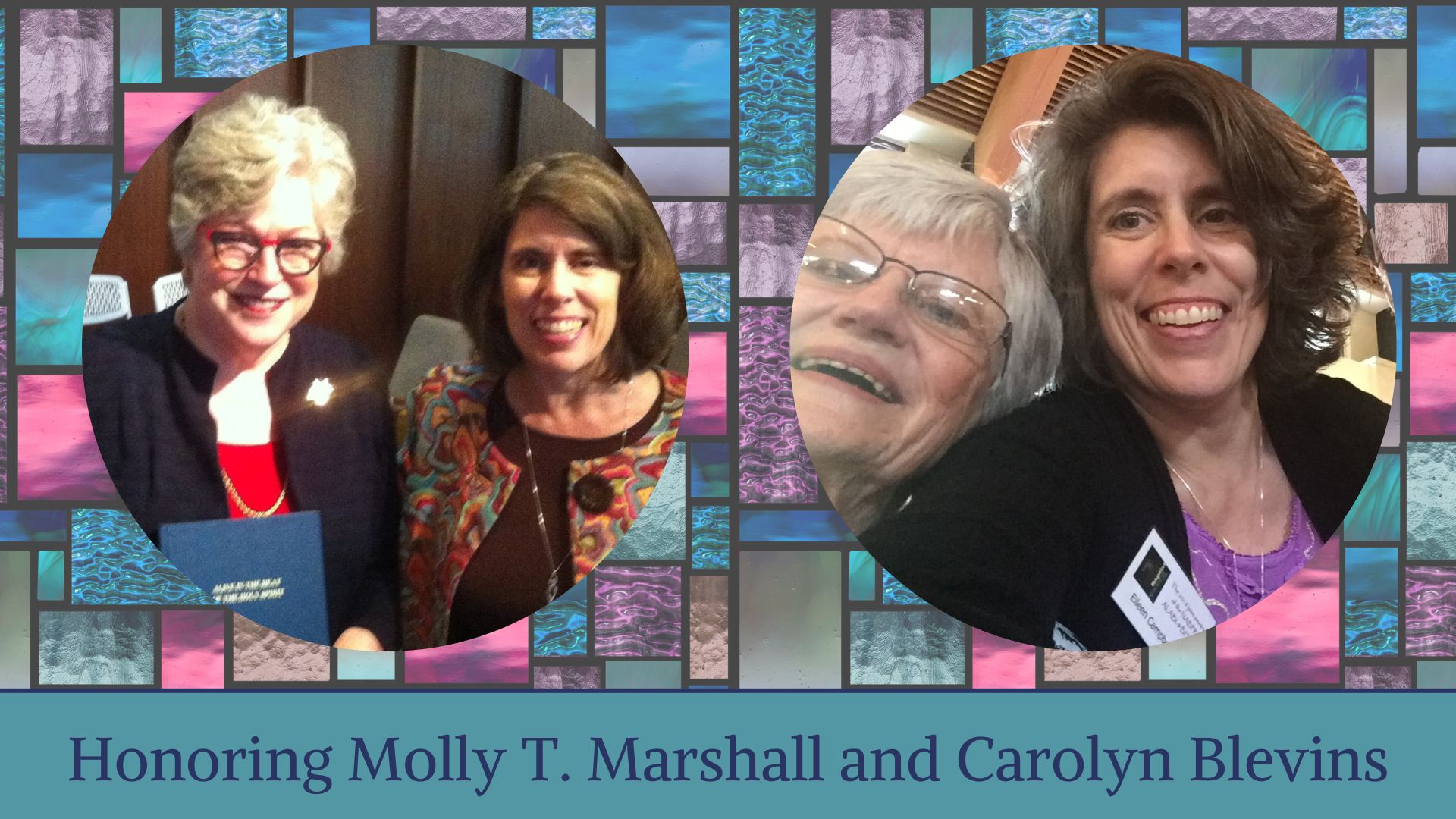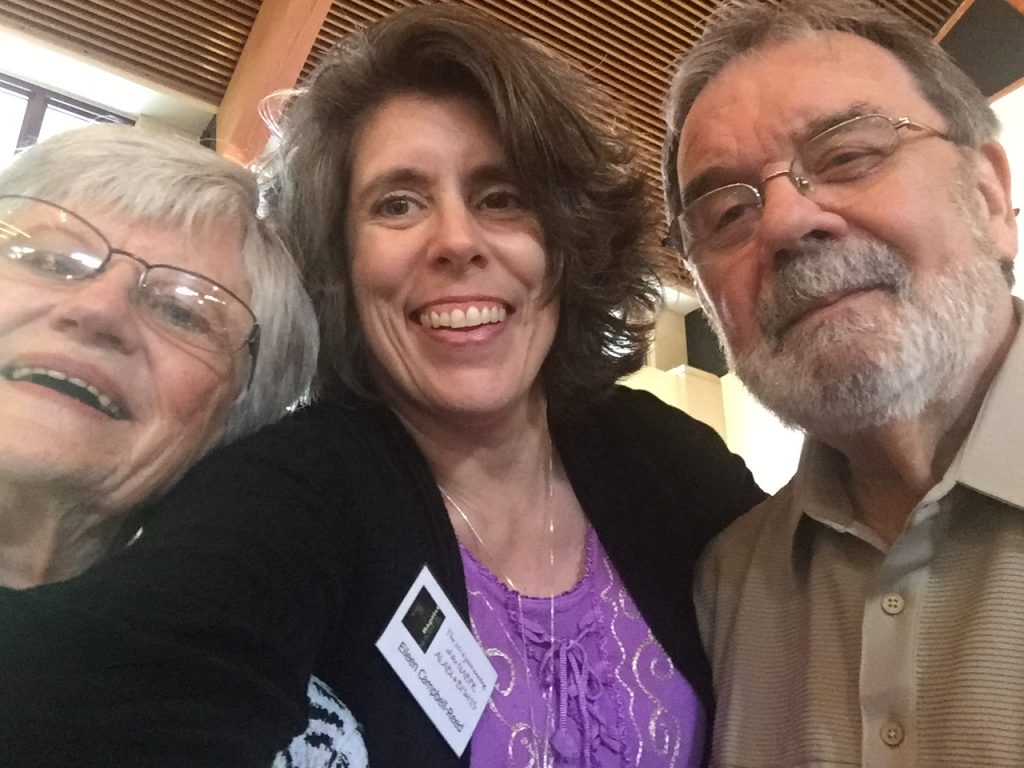Recently I contributed to festschrifts honoring Molly T. Marshall and Carolyn Blevins. Academic mentors helped me find my way into studies of practical theology, history, and ministry. Many teachers encouraged me and pushed me to do my best. Recently I took part in honoring two of those teachers. If you would like to see the full articles, simply write to me, and I will share them.
At Carson-Newman College I took classes with Carolyn Blevins and worked as her grader. She helped me think more carefully, read more thoroughly, and write more boldly. We often laughed when we worked together. And although she took her work very seriously, she did not lose sight of the absurdity of it all. She continues her encouragement and support to me long after my college graduation.
While I was still a college student Dr. Molly T. Marshall preached in chapel at CNC. She is the first woman I heard preach. Soon she became my theology professor in seminary. I took many classes with her including feminist theology and atonement theology. More recently I began working with Molly at Central Seminary in the Women’s Leadership Initiative MDiv program.
“Alive with the Heat of the Holy Spirit,” a festschrift in honor of Molly Truman Marshall. Perspectives in Religious Studies (2014 Volume 41: Issue No. 2).

Kindled by the Ardor of the Wild Spirit of God: An Introduction to the Life and Work of Molly Truman Marshall: pp. 107–119 | Mark S. Medley | Baptist Seminary of Kentucky | Georgetown, KY 40324
In a private conversation several years ago, Molly Marshall said to me, “I want faculty who love God, love the church, and love students.” In many respects, these three loves define her life and ministry. And all three loves are kindled by the ardor of the wild Spirit of God. Weaving together biography and theological reflection on Marshall’s scholarship, profession as a seminary educator and administrator, and ministerial and ecclesial witness, this essay attempts to choreograph an (unauthorized) interpretative dance, which presents the dynamic, mutual indwelling of Marshall’s life story and her three loves.
Molly Truman Marshall: Living Icon for Beholding the Spirit’s Renewal of the Church: pp. 121–136 | Eileen R. Campbell-Reed | Luther Seminary | St. Paul, MN 55108
Pivotal stories in Molly T. Marshall’s life illuminate changes to the church in the last four decades and capture Marshall’s hope for a renewed vision of ministry and theological education. In significant “firsts” as a student, pastor, organizer, professor, and seminary president, Marshall’s life provides an opportunity to behold an era when Baptists struggled at the end of the twentieth century over the meaning of human being, reclaiming the full humanity of women, and longing for encounter with the living God. Through her biography, sermons, and academic writing, Marshall’s life collaborates with the work of the Spirit and becomes a living icon for seeing the Spirit’s renewal of the church.
Diagnosing Vice and Prescribing Virtue: Sloth and the Lord’s Supper: pp. 137–150 | Elizabeth Newman | Baptist Theological Seminary at Richmond | Richmond, VA 23228
While the common understanding of sloth assumes that its corresponding virtue is increased industry, this essay argues that both idleness and busyness are equally indicative of the vice. A more accurate diagnosis of sloth situates its source in a kind of restlessness. Although a prescription of rest seems counterintuitive, I claim that in learning to receive one’s whole being as gift in and through Christ, we are able to enter true rest. Worship, specifically the practice of the Lord’s Supper, provides medicine for sloth by revealing and making present the beauty of new creation, including one’s own.
Wisdom and the Spirit: The Loss and Re-making of a Relationship: pp. 151–167 | Paul S. Fiddes | Regent’s Park College | University of Oxford, Oxford UK
This paper traces the relationship between personified wisdom (“Lady Wisdom”) and the concept of divine Spirit, exploring texts from the Wisdom of Solomon, through Gnostic writings, the Church Fathers, and medieval mysticism, to modern theologians such as the Russian Sophiologists and Wolfhart Pannenberg. Constructively, it appeals for Wisdom not to be entirely absorbed into either “Logos” or “Spirit,” but for the profile of Wisdom to remain visible wherever Wisdom is fruitfully associated with Spirit. It argues that there are considerable gains for the theological idea of participation in allowing the images of Wisdom and Spirit to interpret and shape each other without absorption.
Unfinished Choreographies: Divinization as a Theme and a Challenge: pp. 169–181 | Nancy Elizabeth Bedford | Garrett-Evangelical Theological Seminary | Evanston, IL 60201
The essay develops ideas suggested by Molly Marshall’s work on pneumatology, focusing on divinization or theōsis as it appears in the Latin tradition and its inheritors. It posits that divinization is an activity of God with us in this world that moves to subvert all forces that would harm and destroy God’s beloved creation. This dance of divinization, in which human beings are invited to play an active part, can be imagined as an active process by which God’s Spirit helps us figure out the steps of our unfinished choreographies, because God does not want to dance without us.
From a “Unitive” to a “Plural” Paradigm of Pneumatology: An Interim Report of the State of Spirit(s) in Christian Theology: pp. 183–196 | Veli-Matti Kärkkäinen | Fuller Theological Seminary | Pasadena, CA 91182
The purpose of this essay is twofold. First, it takes a wide critical survey of most current developments in pneumatology at the global and ecumenical level. Second, it suggests a constructive turn from a “unitive” paradigm, in which only one Spirit (of God) is considered while other spiritual realities are dismissed, to a “plural” paradigm. The latter accounts for the Spirit of God within a highly pluralistic cosmology with many other divine spirits, powers, and spiritual realities. Cultural and religious plurality, the rise of postmodern philosophies, and transformations in scientific paradigms are all factors contributing to this change of outlook.
The Work of Seminary Presidents: pp. 197–208 | Daniel O. Aleshire | The Association of Theological Schools in the United States and Canada | Pittsburgh, PA 15275
This essay examines seminary presidential leadership. It argues that leadership of a theological school requires both the general qualities of leadership that are needed in other higher education institutions and particular qualities that fit the unique realities of theological schools. The article draws heavily on two recently-completed studies. The first is a study of seminary presidents that identified five characteristics found to be most fundamental to successful seminary leadership. The second is a study of senior leaders of ATS schools who are women. It identifies the ways in which the leadership of women is similar to that of men as well as leadership issues that women encounter and to which they must respond that men do not encounter in the same way.
++++++++++++++
“A Festschrift in Honor of Carolyn DeArmond Blevins” Baptist History and Heritage (Spring 2016 Vol 51, No. 1)
In Honor and Celebration of Carolyn Blevins – Bruce T. Gourley
Carolyn Blevins: Trailblazer – Doug Weaver
In the Tradition of Carolyn Blevins – Merrill M. Hawkins Jr
Carolyn DeArmond Blevins – Kay W. Shurden and Walter B. Shurden Sr
Changing Hands: The Practice of Ordaining Baptist Women – Eileen R. Campbell-Reed
The struggle to respond to God’s call when other believers opposed that response has been a continual struggle for women. – Carolyn Blevins[i]
Across five decades Baptist hands are changing the ways they confer roles and authority for ministry through ordination. Baptists have responded to many social and theological factors, yet one change stands above the others in its significance and impact. When a Southern Baptist Convention (SBC) church first ordained a woman to ministry in 1964, the practices, processes and meanings of ordination took new directions. This essay surveys Baptist women’s ordination as novelty, controversy, shifting process, and contested symbol in Baptist life.
[i] Carolyn D. Blevins, Women’s Place in Baptist Life (Nashville, TN: Baptist History and Heritage Society, 2003), 15.
Journey to Ordination: Addie Davis and Watts Street Baptist Church – Pamela R. Durso
“A home without walls”: WMU and the Reinterpretation of Gender Ideology – Carol Crawford Holcomb
Tennessee Women: Ministering to the Cities – Delane Tew
A “True Baptist” Theology of Women in Ministry – Elizabeth Flowers
Women and the Baptist Experience – Carolyn DeArmond Blevins
Carolyn DeArmond Blevins: A Selected Bibliography – Merrill M. Hawkins Jr.
In fact it was easy to write with the purpose of honoring Molly T. Marshall and Carolyn Blevins. They are intentional and generous in their teaching, mentoring, and friendship. It is a joy to count them among my living saints.





